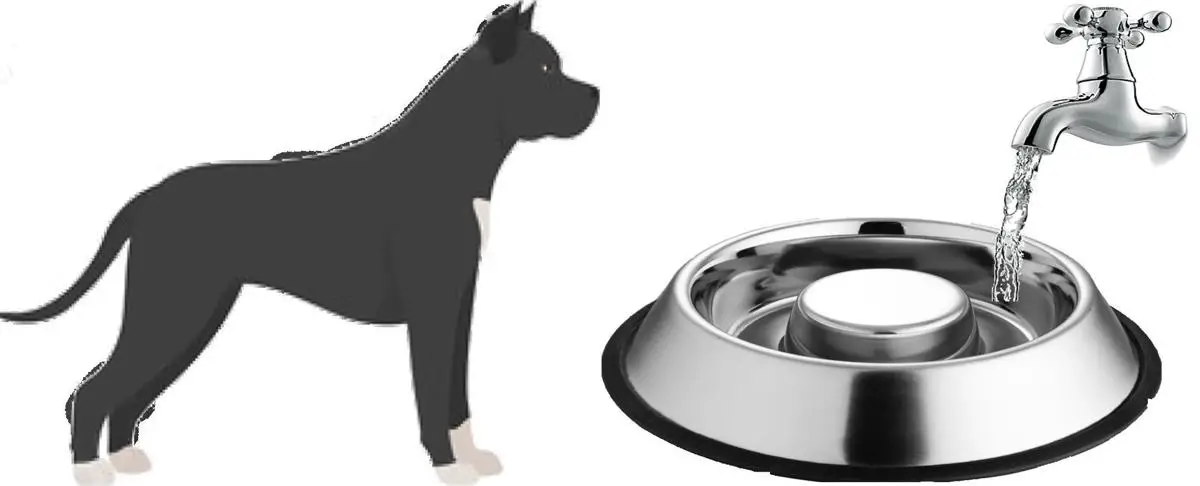Quick Links: Table of Contents
- Bull Terrier Breed Overview
- History of the Bull Terrier Breed. Where Bull Terriers came from
- What the Bull Terrier Looks Like
- How Much is the Bull Terrier Puppy?
- Best Bull Terrier Breeders
- Adopting or Rescuing the Bull Terrier
- Bull Terrier Growth
- How Long Bull Terriers Live
- Bull Terrier Litter Size
- How Fast Bull Terriers Can Run
- Good Names for Bull Terriers
- How Intelligent are Bull Terriers?
- How Popular are Bull Terriers with New Dog Owners?
- Health Problems in Bull Terriers and How to Prevent Them
- How to Take Care of Bull Terrier
- Dog Breeds That Are Similar to Bull Terriers
- Other Things to Know About Bull Terriers
Bull Terrier Breed Overview
The Bull Terrier is a small-sized dog.
The adult Bull Terrier stands 21 to 22 inches tall at the shoulder.
The Bull Terrier belongs to the Terrier Dogs group.
Dogs in the Terrier Dogs group, like the Bull Terrier, were originally bred to go underground to hunt rodents and other small wild animals (vermin).
Terriers come in a wide range of sizes and shapes, but all terriers are energetic, highly intelligent, and territorial. Terries also have the tendency to escape. They require a securely fenced yard.
The fact that Bull Terriers belong to the Terrier Dogs group is one of the reasons why Bull Terriers have the personality and temperament that they have.
The temperament of the Bull Terrier is generally described as:
- Active
- Keen
- Protective
- Stubborn
- Sweet-Tempered
- Trainable
History of the Bull Terrier Breed. Where Bull Terriers came from
The Bull Terrier breed was created in the 1800s in England by crossing the Bulldog with a now-extinct breed called the Old English Terrier, and later with a Spanish Terrier to add height to the new breed.
This cross-breeding resulted in a strong and muscular breed that was initially used for dog fighting but later as companions.
In response to the growing demand for an all-white breed, James Hinks crossed the “bull and terrier” with a white English Terrier and a Dalmatian, producing the much more fashionable white Bull Terrier.
The breed was especially popular among gentlemen for its fighting ability (while it was still legal at the time), and it was a big hit at the show.
.
What the Bull Terrier Looks Like
The Bull Terrier is a muscular, stocky breed with a body that is slightly longer than it is tall.
The round, compact, and catlike feet may appear out of place on such a stocky and muscular animal, with moderately long front legs and hind legs characterized by strong, muscular thighs.
These feet and legs, however, propel this dog in an agile and powerful stride.
The breed has a head that resembles a football, with a long and strong head, a deep muzzle, and a flat forehead that runs from ear to ear.
They have small, thin ears that are close together on top of the head, and they are the only breed with triangular shaped ears.
Bull Terriers can be white, brindle, brown, red, and several other different colors.
.
How Much is the Bull Terrier Puppy?

The average price of a Bull Terrier puppy is $1800. The price of a Bull Terrier puppy ranges from $1300 to $2000.
A lot of factors determine the price of the Bull Terrier. These factors include what health records the Bull Terrier puppy has, the lineage of the Bull Terrier puppy, the US state the breeder is located in, etc.
To estimate how much you can expect to pay for a puppy Bull Terrier based on the many factors that determine the price of the Bull Terrier puppy, check out our calculator that lets you estimate how much you should expect to pay for the Bull Terrier puppy based on what you want in the puppy.
When looking to buy a puppy, look at buying a puppy only from well-established breeders that breed puppies primarily for the love of the Bull Terrier breed, and secondarily for profit. Do not buy a puppy from a puppy mill. Puppy mills mass-produce puppies in bad living conditions for maximum profit.
You may also consider adopting instead of buying a puppy. Adoption costs are very low compared to the price of a puppy.
Best Bull Terrier Breeders
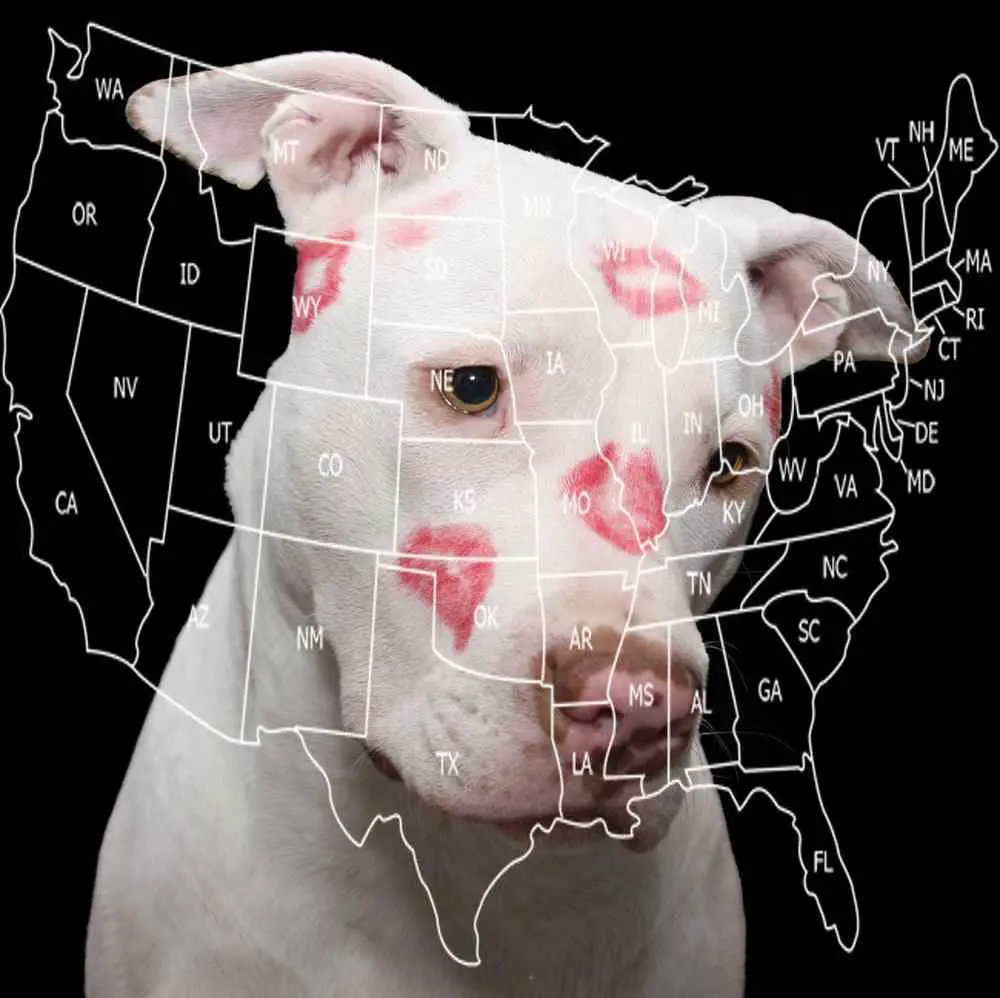
We have researched reputable Bull Terrier breeders that you can buy a puppy.
Go to this page for our complete list of reputable Bull Terrier breeders in various states in the United States.
On this page, you will see how much these breeders sell their puppies for, and how many puppies they have available.
A few of these breeders are listed below.
Gabriel Valencia
Puppy Price: Check with breeder
Yanirys Leon
Puppy Price: $1800
Ida McCall
Puppy Price: Check with breeder
Glen Moore
Puppy Price: Check with breeder
Bullterriersofcolorado.
Puppy Price: $1500
Adopting or Rescuing the Bull Terrier
You may consider adopting a dog instead of buying a puppy. Many dogs, Bull Terriers included, are currently available for adoption in your local dog shelters.
These helpless but adorable dogs are waiting in dog shelters hoping that someday someone will rescue them. Dog adoption costs are lesser than the cost of a new puppy. Dog adoption costs are usually around $300 or even less.
In addition to your local dog shelter, another good place to find dogs that are available for adoption is petfinder.com.
Below is an adorable Male Bull Terrier named Steve that is currently available for adoption on Petfinder.com. You can find other lovely Bull Terriers like Steve on pefinder.com.
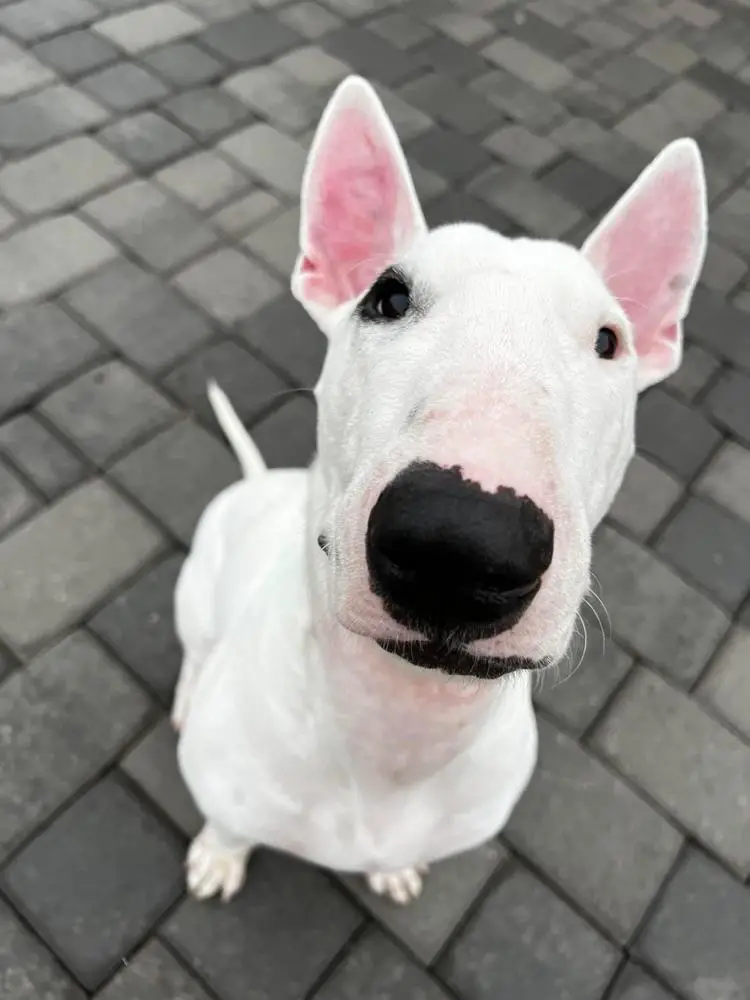
Thomas is the name of another Bull Terrier (Male) on petfinder.com that is looking for a new forever home.
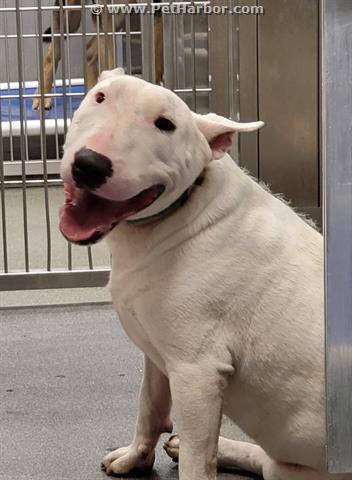
You can find more Bull Terriers that are available for adoption on petfinder.
Bull Terrier Growth
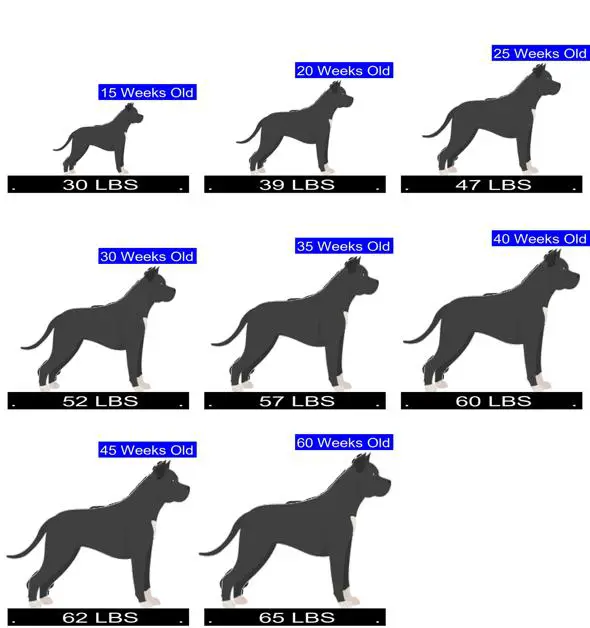
New Bull Terrier owners need to know about the growth of their Bull Terriers. This will help them plan their living spaces accordingly.
Also, knowing the typical growth pattern of the Bull Terrier will help new owners catch the abnormal growth of their Bull Terrier early.
See our calculator for predicting how big your Bull Terrier puppy will get. You will also learn about the typical weight of the Bull Terrier at different ages and how to catch abnormal growth in your Bull Terrier
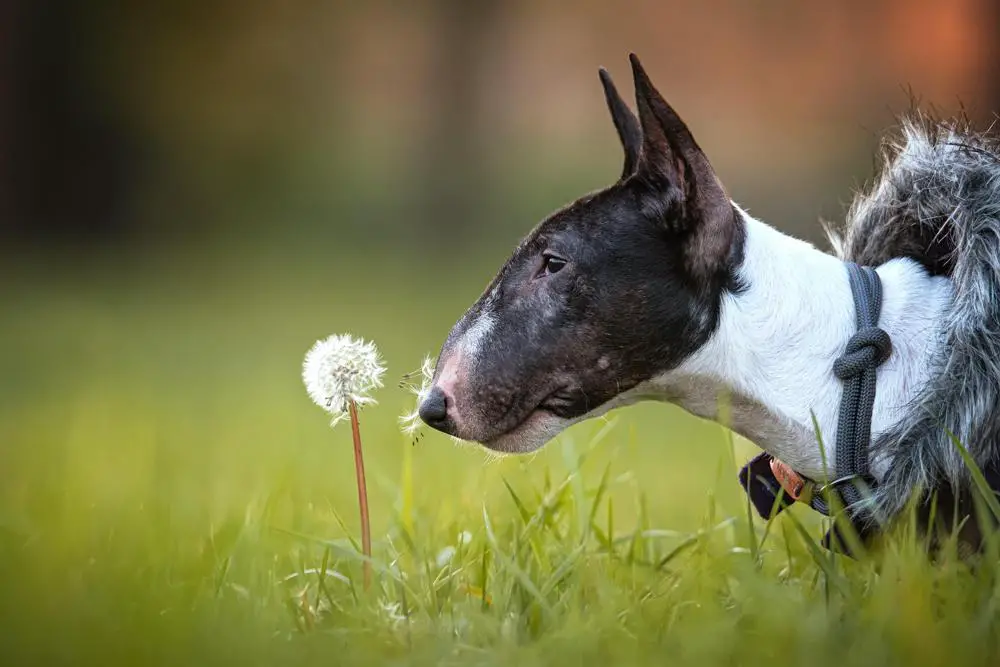
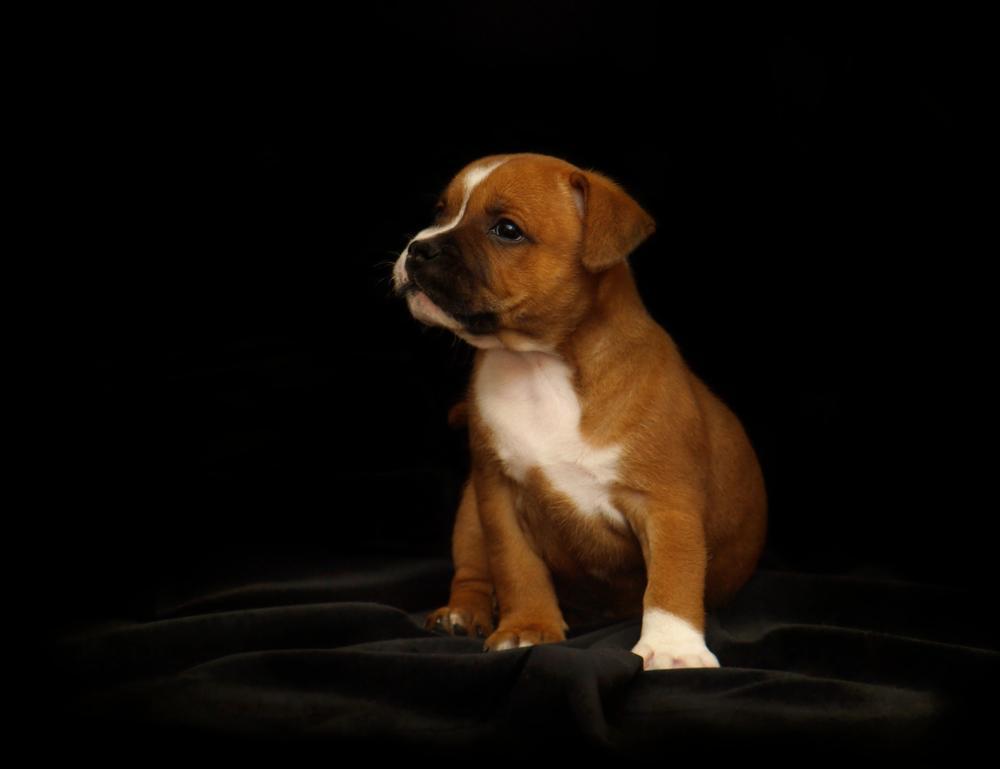

How Long Bull Terriers Live
The lifespan of the Bull Terrier is typically from 10 to 15 years.
Moreover, a few years back, veterinarian researchers performed a scientific study to determine the lifespan of the Bull Terrier. In this study, the scientists collected data on how long 209 pet Bull Terriers lived.
From the study, it was found that Bull Terriers have an average lifespan of 10 years. Furthermore, the study found that it is not uncommon for Bull Terriers to live as long as 18.5 years.
Note that you need to put in some effort if you want your Bull Terrier to live long.
Bull Terriers live long if they eat well, drink well, exercise well, and visit the veterinarian regularly.
There are also dog supplements that you can give your Bull Terrier to improve your Bull Terrier`s quality of their life.
Click here to learn more about how to make your Bull Terrier live long.
Bull Terrier Litter Size
Researchers from the Norwegian School of Veterinary Science did a study where they counted the numbers of puppies in 36 different Bull Terrier birth litters.
From this study, the researchers found that the average number of puppies that Bull Terriers can have is 5 puppies. Also, the Bull Terrier can have as few as 1 puppies per litter and as many as 9 puppies per litter.
The number of puppies that the Bull Terrier will have depends on factors such as the age of the Bull Terrier, the method of pregnancy, etc.
Click here to see our calculator for predicting how many puppies your Bull Terrier will have and how the litter size of the Bull Terrier compares to the litter size of other dog breeds.
How Fast Bull Terriers Can Run

How fast a dog breed can run is a good measure of how athletic the dog breed is.
The American Kennel Club (AKC) regularly conducts dog running competitions. The AKC records the running speed of competing dogs in these competitions. These competitions are open to all dog breeds.
Based on our analysis of the speeds of 18 different Bull Terriers, the average speed of the Bull Terrier is 22.6 mph (36.3 kmph).
The fastest speed on AKC record that the Bull Terrier ran in a race is 26.11 mph (42.0 kmph) and the minimum speed on record in a race for a Bull Terrier is 20.01 mph (32.2 kmph).
Click here to see how the speed of the Bull Terrier compares to the speed of other dogs and other mammals such as cats, horses, humans, etc.
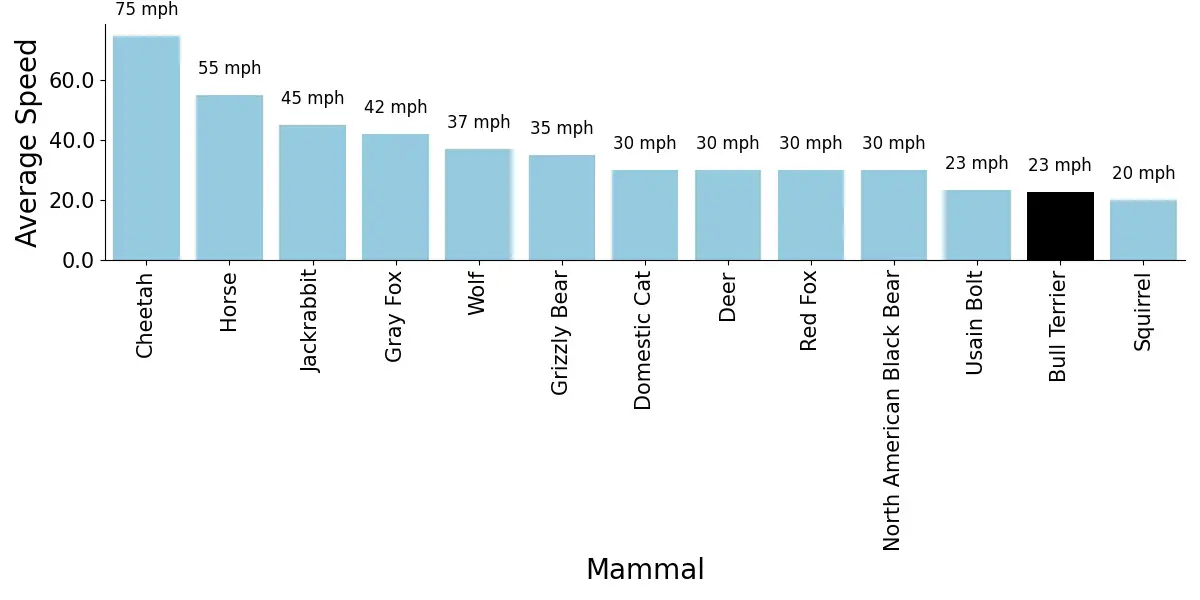
Good Names for Bull Terriers
Here are some really good names that are typical for the Bull Terrier ranked by popularity:
- Dog
- Chiko
- Spud
- Apollo
- Bacca
- Chico
- Whitaker
- Mitch
- Bino
- Julio
How Intelligent are Bull Terriers?
| Bull Terrier | |
|---|---|
| Intelligence Rank | 66 out of 130 dog breeds |
| Trainability | Tend To Learn New Commands After 40 To 80 Repetitions! |
According to Prof. Stanley Coren, a Canadian psychology professor/dog trainer, the total intelligence that a dog demonstrates is the addition of three types of intelligence. These intelligence types are:
- Instinctive Intelligence: This is the natural intelligence that comes from instinct. For example, dog breeds that have been historically bred to be guard dogs will have a high `guarding` intelligence compared to dogs that were not bred for guarding.
- Adaptive Intelligence (learning and problem-solving ability): This indicates what a dog can learn to do for himself or herself. Adaptive intelligence is specific to each dog, and not breed specific. You can improve your dog`s adaptive intelligence by investing time to train your dog.
- Working/Obedience Intelligence: This type of intelligence is breed-specific. Certain dog breeds tend to have higher working/obedience intelligence than some other breeds. This intelligence is the closest to what we might call school-learning ability and it is based upon what the dog can learn to do when instructed by humans. This type of intelligence can be measured for each dog breed and compared to that of other dog breeds.
Professor Stanley Coren measured and ranked the working intelligence of about 130 different dog breeds.
Prof. Coren found that the Bull Terrier has an obedience intelligence rank of 66 out of 130 dog breeds. Thus, Prof. Coren put Bull Terriers in the `Fair Working/Obedience Intelligence Dogs` category.
This means that Bull Terriers tend to learn new commands after 40 to 80 repetitions!.
However, we should mention that a dog should not be judged based on its intelligence alone. There are other important factors you need to consider when deciding on which dog breed to get. These other factors include sociability, adorability, and compatibility of the dog breed with your lifestyle.
See the intelligence ranking of some other dog breeds below:
| Breed | Intelligence Rank |
|---|---|
| Rottweiler | 9 |
| Australian Cattle Dog | 10 |
| Miniature Schnauzer | 12 |
| German Shorthaired Pointer | 17 |
| Irish Water Spaniel | 24 |
| Chesapeake Bay Retriever | 27 |
| Giant Schnauzer | 28 |
| Airedale Terrier | 29 |
| Border Terrier | 30 |
| Welsh Springer Spaniel | 31 |
| Norfolk Terrier | 56 |
| Maltese | 59 |
| Italian Greyhound | 60 |
| Dandie Dinmont Terrier | 62 |
| Bull Terrier | 66 |
| Bullmastiff | 69 |
| Shih Tzu | 70 |
| Pekingese | 73 |
| Borzoi | 75 |
| American Bulldog | 77 |
How Popular are Bull Terriers with New Dog Owners?
Every year, the American Kennel Club (AKC) publishes information on how popular a dog breed is in that particular year. The AKC gets the popularity information of a breed from how many dogs of that breed the owners register with the AKC every year. The AKC collects this data for about 200 dog breeds.
The graph below shows the popularity trend of the Bull Terrier.
The popularity of the Bull Terrier averaged over the years is Number 58 out of about 200 dog breeds.
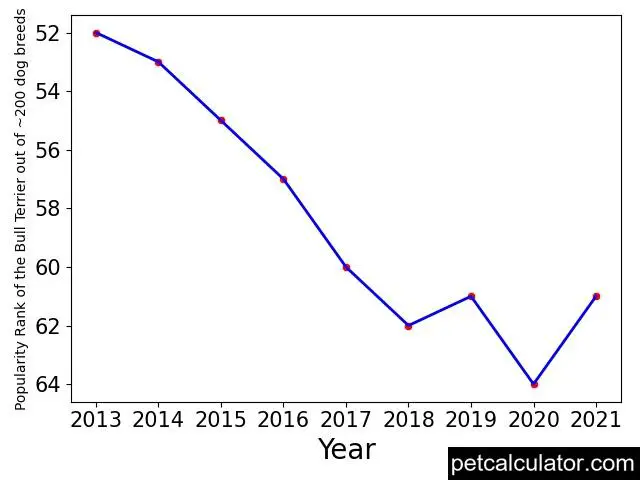
Do not get a dog breed just because it is a popular dog breed. And do not reject a dog breed just because it is an unpopular breed.
Health Problems in Bull Terriers and How to Prevent Them
Every dog breed has its own set of health problems that it tends to develop. There is nothing like a perfect dog breed.
The Bull Terrier is prone to certain genetic health conditions. The Orthopedic Foundation for Animals (OFA) is an organization that keeps track of genetic health problems in dog breeds.
From the extensive records that the OFA keeps, the OFA knows what health problems each dog breed is naturally prone to develop.
Hence, the OFA recommends which health screening breeders should perform on a dog breed to make sure that the breeders won`t breed `defective` dog parents that can pass down defective genes to their puppy offspring.
If you want a Bull Terrier puppy that will grow up to be healthy, make sure that your Bull Terrier breeder screens your puppy or your puppy`s parents for the health problems that the OFA recommends for your puppy`s breed. This will increase the chances that your puppy is free from genetic defects.
The following are the health tests that Orthopedic Foundation for Animals (OFA) recommends that breeders should screen Bull Terriers for:
You can find out more about OFA`s recommended tests for Bull Terriers here.
How to Take Care of Bull Terrier
To take good care of your Bull Terrier, you need to make sure that you groom your Bull Terrier regularly.
Secondly, you need to find a veterinarian in your area that will routinely check the health status of your Bull Terrier regularly, and give you appropriate recommendations on your Bull Terrier`s preventative care.
Thirdly, you need to commit some time to exercise your Bull Terrier daily. Regular exercise helps improve the health and quality of life of your Bull Terrier.
Also, you need to feed your Bull Terrier high-quality dog food, and the food should be of the right amount to prevent your Bull Terrier from getting overweight or underweight.
See our recommendations on what to feed the Bull Terrier and how much food to feed the Bull Terrier at different life stages.
Finally, you need to make sure that your Bull Terrier has access to clean water all the time. See our recommendations on how much water your Bull Terrier needs to drink at different ages.
Dog Breeds That Are Similar to Bull Terriers
If you have not made up your mind on which dog breed to get, you may also want to consider some other dogs similar to the Bull Terrier.
We crunched the numbers and found that the following dog breeds that have similar behavior and temperament as the Bull Terrier:
- American Pit Bull Terrier (73 percent match with Bull Terrier). Learn more about the American Pit Bull Terrier here.
- Field Spaniel (74 percent match with Bull Terrier). Learn more about the Field Spaniel here.
- Westiepoo (73 percent match with Bull Terrier). Learn more about the Westiepoo here.
Other Things to Know About Bull Terriers
Here are some of the very important characteristics of the Bull Terrier that you need to know about the Bull Terrier breed:


